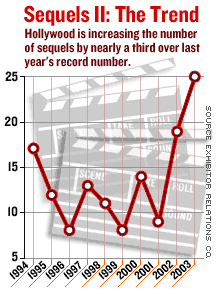NEW YORK (CNN/Money) -
Hollywood is betting it can make money on too much of a good thing this year as it rolls out a record number of movie sequels.
 |
|
| "Matrix Reloaded," set to debut May 15, is one of two Matrix sequels due in theaters this year. |
The studios plan to release a record 25 sequels this year, with 16 of them due this summer alone, according to Exhibitor Relations Co., a leading box office tracking firm. That's up from 19 sequels last year and a mere nine in 2001.
Included are many films expected to be this summer's biggest blockbusters. "X2: X-men United," took in $155.2 million in 93 countries last weekend -- a record opening worldwide -- with about $86 million in ticket sales in the United States alone. The original "X-Men" took in $54.5 million on its opening weekend in the United States nearly three years ago.
"The Matrix Reloaded" is set to debut May 15, the first of two Matrix sequels set to hit theaters this year. "The Matrix Revolutions" is due in theaters Nov. 5.

Sequels to recent hits "The Fast and the Furious," "Charlie's Angels," "Legally Blonde," as well as older hits "Dumb and Dumber," "Terminator 2" "Bad Boys" and "The Exorcist" are also due in the next 10 weeks, meaning the industry could go from early May through late July with one sequel or another topping or nearly topping the box office take.
"The studios are hedging bets. They have a known commodity," said Paul Dergarabedian, president of Exhibitor Relations. "Some of these sequels have been out-earning their predecessor's opening weekend. But when it comes to final box, they don't always measure up."
And that's the problem for Hollywood. Forget that the number of sequels the critics deem better than their corresponding originals probably couldn't fill a suburban multiplex -- the issue is that most sequels will take in less worldwide box office than the original hits, if history is any indication.
Of the 19 sequels released last year, only four generated more ticket sales than their original, according to figures from Box Office Mojo.com, another box office tracking service. And many of the sequels had higher costs than their originals for production, marketing or both, according to available figures.
 |
|
| The sequel for "X-Men" is seeing better box office, but it'll need that due to higher production and marketing costs. |
Falling sales and rising costs do not add up to growing profits, especially if money devoted to making sequels crowds out lesser known filmmakers struggling to make what could be the next lower-cost surprise big hit.
"Now audiences expect sequels to be bigger, badder than what came before it," Dergarabedian said. "It's a risk for the studios, because it's very expensive, and they better hope that the sequel does better than the original."
So even while X-2 had a strong opening, it will have to keep doing well to make up the increased costs. Box Office Mojo estimates that production costs for the sequel jumped 47 percent to $110 million from $75 million for the 2000 original, while marketing costs soared 76 percent to $40 million.
Aside from special effects, costs also are rising to keep the stars of an original hit movie for the sequel.

"Unless the managers of the original were smart enough to nail down principals for more than one movie, you have to pay the piper," said Jason Squire, editor of "The Movie Business Book" and an adjunct professor at the University of Southern California.
Many of those sequels that saw a drop in box office still posted impressive numbers.
"Star Wars Episode II: Attack of the Clones" did $310.5 million in box office last year, putting it No. 3 among all the films released in 2002, just behind another sequel, "The Lord of the Rings: The Two Towers." But the take for the fifth Star Wars movie put it $120.5 million behind that of 1999's "Star Wars Episode I: The Phantom Menace."
Then there is the risk that a sequel could bomb at the box office, bringing in nothing but red ink.
Ticket sales of last year's "Analyze That" tumbled 80 percent to just $32 million from the original "Analyze This." That was well below the estimated production cost of $60 million and marketing cost of $30 million for the Robert DeNiro and Billy Crystal sequel.
| Related stories
|

|
|
|
|
"Generally comedies and family movies have a harder time on sequels than action or science fiction films," said Brandon Gray, box office analyst for Box Office Mojo.com. "That would explain the problems of 'Analyze That' or 'Stuart Little 2.' This year, 'Legally Blonde 2' could be in trouble. It doesn't have the hard core fan base of 'The Matrix' or 'X-Men.' And it opens opposite 'Terminator 3.'"
Of this year's sequels, the two studios of AOL Time Warner (AOL: Research, Estimates) have the most, with nine.
Even without a Harry Potter movie for the first time since 2000, AOL Time Warner has the two Matrix movies, "Terminator 3: Rise of the Machines", "When Harry Met Lloyd: Dumb and Dumberer" and the final installment of its Lord of the Rings trilogy. AOL Time Warner also is the parent of CNN/Money.
Click here for a look at media and entertainment stocks
Walt Disney Co. (DIS: Research, Estimates) has five sequels due out, including two -- "Jungle Book 2" and "Shanghai Knights" -- that already have come and gone from theaters.
Sony (SNE: Research, Estimates) and Metro-Goldwyn-Mayer Inc. (MGM: Research, Estimates) each have three sequels, while Universal Pictures, a unit of Vivendi Universal (V: Research, Estimates), and Viacom Inc.'s (VIA: Research, Estimates) Paramount Pictures each have a pair of sequels. Fox Entertainment Group (FOX: Research, Estimates) has only one -- the current hit X2.

|

